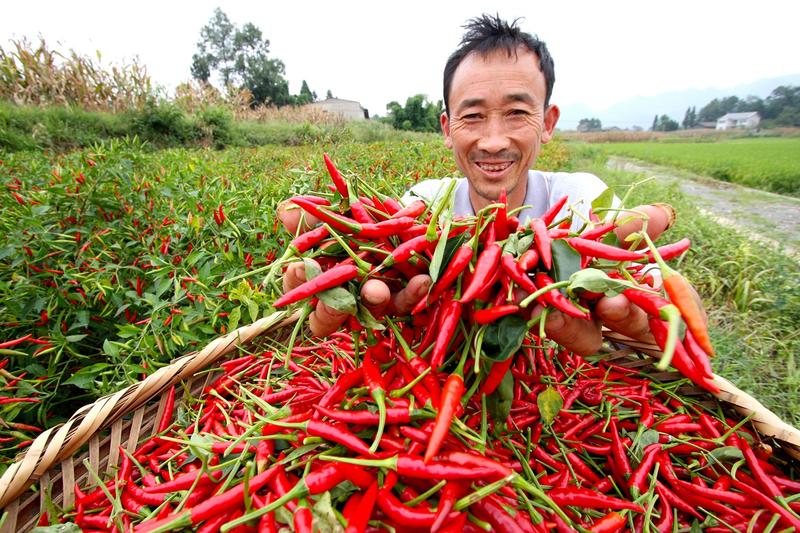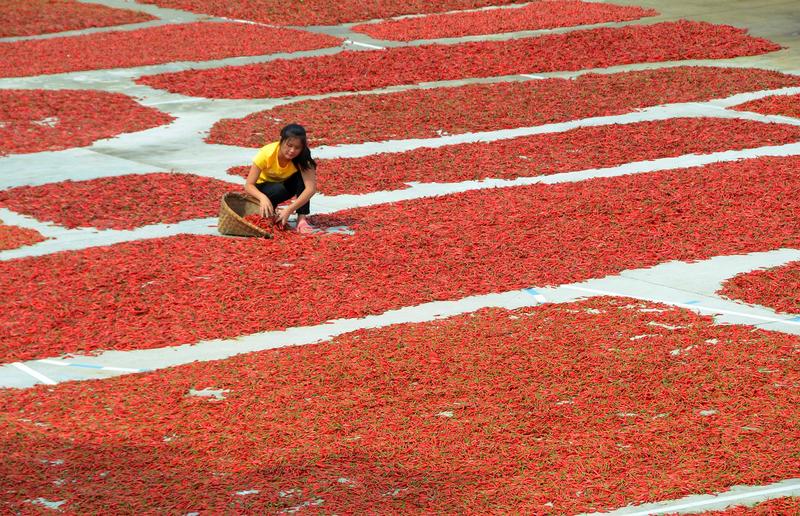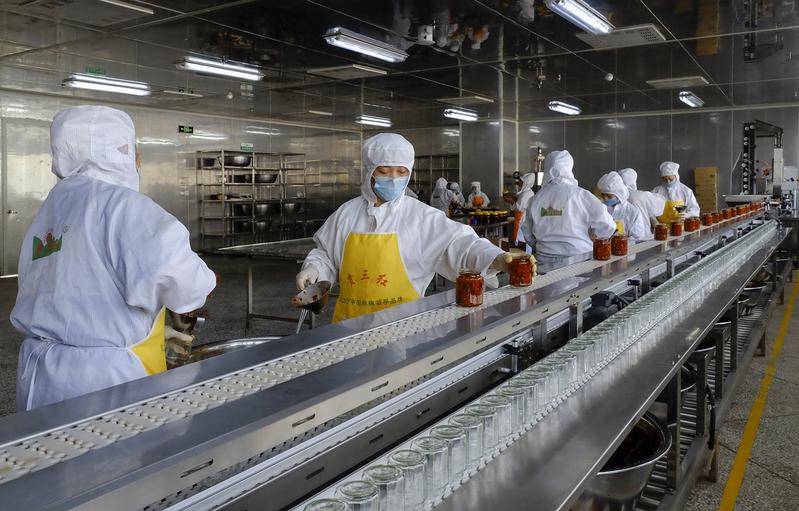Plan to raise quality, processing to transform province into major producer of spicy delight
 A farmer displays chiles he has just harvested from the field in Zunyi, Guizhou province. (PHOTO PROVIDED TO CHINA DAILY)
A farmer displays chiles he has just harvested from the field in Zunyi, Guizhou province. (PHOTO PROVIDED TO CHINA DAILY)
Editor's Note: China Daily is running a series of stories on old revolutionary bases with profound history and heritage that are striving to lead local people on the road to prosperity in the new era.
Zunyi, Guizhou province, is developing its chile industry to consolidate poverty alleviation efforts. Having played a pivotal role in the history of the Communist Party of China, the city was the location of the Zunyi Conference, a crucial turning point in the Long March (1934-36), which led to the ultimate success of the revolution.
By 5 am, the chile trading center in Zunyi's Xinpu New District is already bustling as farmers and merchants try to broker the best deals.
"The center provides farmers a better trading environment, abundant storage and better transportation services," said Wu Yingbo, a chile farmer from nearby Xinzhou town. "It's a convenient way for everyone to develop their business and is a good platform."
 Chiles are aired on the sunning ground in Zunyi. (PHOTO PROVIDED TO CHINA DAILY)
Chiles are aired on the sunning ground in Zunyi. (PHOTO PROVIDED TO CHINA DAILY)
Wu Yingbo is a 45-year-old farmer from Yumen village in Xinzhou town. He now oversees 12 square kilometers of chile plantations across the country, including plantations in Gansu province and the Xinjiang Uygur autonomous region.
"I used to work on a cotton farm in Xinjiang in 2004, but I saw that the agricultural sector was better developed there than in my hometown, so I decided to plant chiles," Wu said, adding that he brought seeds from Guizhou to the autonomous region.
During a trip back home in 2017, Wu saw a villager in her 60s carrying homemade dustpans to sell in town. "She took five days to make eight dustpans and sold each for 5 yuan (74 cents) apiece," he said.
Wu felt that he should move some of his business home to provide better opportunities for his fellow villagers.
 A variety of chile sauces on display at an exposition held in Guizhou. (HAN YU / FOR CHINA DAILY)
A variety of chile sauces on display at an exposition held in Guizhou. (HAN YU / FOR CHINA DAILY)
Today, he manages chile plantations with an area of about 2 sq km in Guizhou. Their yields are sold to Kunming in Yunnan province, Chengdu in Sichuan province and Chongqing, cities known for their love of spicy foods.
"In Guizhou, the picking and cutting of chiles is done by hand to ensure the best quality," Wu said.
Two years ago, he set up a chile cooperative, which provides jobs picking and processing chiles.
"Cutting chiles is something that can be done by people of different ages," he said. "Those who cut fast can earn 110 yuan a day."
Like Wu, chile farmers from nearby Xiazi, Xinzhou and Yongle are frequent visitors to the trade center.
Called China's Chile Town, the center opened in 2017. With 13 chile drying lines and cold storage warehouses, it is one of the biggest chile trade centers in southwestern China. It sold 550,000 metric tons of the peppers last year, worth 9 billion yuan.
 Employees at a chile processing company in Zunyi work on the production line. (HU ZHIGANG / FOR CHINA DAILY)
Employees at a chile processing company in Zunyi work on the production line. (HU ZHIGANG / FOR CHINA DAILY)
It not only deals in chiles produced in Guizhou, but also in those produced in other areas like Hunan and Henan provinces and Xinjiang. There were over 40 registered chile cooperatives in Xinpu last year, employing 2,800 households and producing 135,000 tons of peppers.
Apart from creating trade platforms, the local government also works with agronomists to improve the output, taste and quality of chiles.
Tian Hao, deputy director of Zunyi's Chile Research Institute, has been working on improving chile seeds for a decade.
"It is widely accepted that the quality of chiles grown in Zunyi is high. However, problems also exist, such as the poor purity of cultivars, low resistance and low yields after years of production," Tian said.
 An aerial photo shows a chile industry zone in Zunyi, Guizhou province. (FENG KUI / FOR CHINA DAILY)
An aerial photo shows a chile industry zone in Zunyi, Guizhou province. (FENG KUI / FOR CHINA DAILY)
Chiles can only be planted once a year in Guizhou, so to shorten the time needed to breed new varieties. Tian and his fellow scientists have split their time between Hainan, where the climate is much warmer, and Guizhou for the past decade to speed up the process.
"Good seeds grow well with good planting, so training farmers is also critical to ensuring good yields," Tian said, explaining another important part of his work.
Data shows that in 2020, Guizhou produced 7.24 million tons of chiles valued at over 24 billion yuan.
"We will focus on developing new varieties, improving quality, brand-making and standardizing manufacturing centers," said Bu Tao, deputy director and spokesman for Guizhou's Department of Agriculture and Rural Affairs at a news conference on the Chile Expo held in Guizhou last year.
Zhao Yandi contributed to this story.
Contact the writers at yezizhen@chinadaily.com.cn



